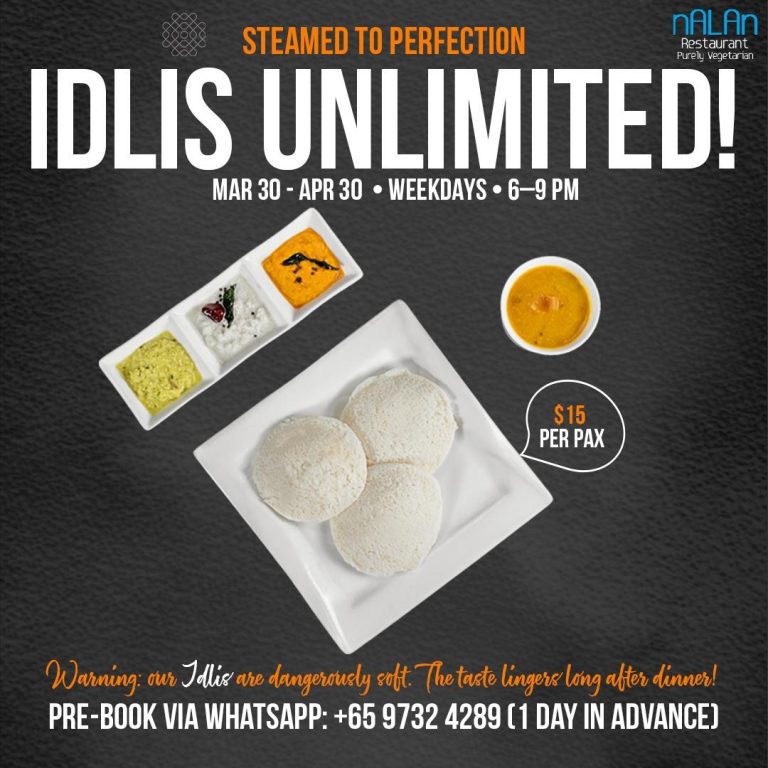
Idli, the soft, fluffy, steamed rice cake, is a beloved staple of South Indian cuisine, cherished for its light texture, health benefits, and versatility. At Nalan Restaurant, we celebrate this iconic dish with passion, especially during our vibrant Idli Festival. In this article, we’ll explore the fascinating origins of idli, its diverse varieties, traditional and modern preparation methods, and why Nalan’s idlis are a must-try in Singapore. Whether you’re a food enthusiast or a curious traveler, dive into the world of idli with us!
Soft, fluffy, and naturally gluten-free, Idli is a beloved South Indian breakfast staple made from fermented rice and urad dal (black gram). Served with coconut chutney, tangy tomato chutney, and piping hot sambar, idli is more than just food – it’s a tradition passed down through generations.
Idli’s history is as rich as its flavour. While it’s synonymous with South Indian cuisine, its origins are debated among food historians. The earliest mention of a dish resembling idli, called “iddalige,” appears in a 920 CE Kannada text, Vaddaradhane by Shivakotiacharya, describing a black gram batter-based preparation. By 1130 CE, the Sanskrit encyclopedia Manasollasa by King Someshwara III references “iddarika,” a spiced urad dal dish.
Some historians, like K.T. Achaya, suggest idli may have roots in Indonesia (800–1200 CE), where a similar fermented dish called “kedli” existed. Cooks from Hindu kingdoms in Indonesia might have brought the recipe to India. Alternatively, Gujarati traders or Arab settlers may have influenced its evolution, with references to idli-like dishes in texts like the 1520 CE Varṇaka Samuccaya (as “idari”). By the 17th century, Tamil texts like Maccapuranam mention idli as “itali,” cementing its place in South Indian culture.
Regardless of its origins, idli became a South Indian icon, perfected through fermentation and steaming techniques, making it a nutritious, digestible breakfast favourite.
Idli’s versatility shines through its many regional and modern variations, each offering unique flavors and textures. Here are some popular types:
Classic Idli: Made from a fermented batter of rice and urad dal (split black gram), steamed to fluffy perfection. Served with coconut chutney and sambar.
Rava Idli: Originating in Karnataka’s Mavalli Tiffin Rooms during World War II rice shortages, this semolina-based idli skips fermentation for quick preparation.
Kanchipuram Idli: A spiced version from Tamil Nadu, flavoured with black pepper, cumin, ginger, and cashews, often steamed in banana leaves.
Thatte Idli: A plate-sized idli from Karnataka, known for its soft texture, made with urad dal, poha, and sabudana.
Millet Idli: A healthy twist using ragi, jowar, or bajra, perfect for gluten-free and diabetic diets.
Stuffed Idli: Filled with spiced potatoes, chutney, or paneer for a flavourful surprise.
Mini Idli: Bite-sized idlis, ideal for dipping in sambar or serving as appetisers.
Oats Idli: A fibre-rich, modern variant for health-conscious eaters.
Vegetable Idli: Infused with carrots, peas, or spinach for added nutrition and colour.
Black Rice Idli: Made with nutrient-rich black rice, offering a unique taste and look.
From traditional to innovative, idli’s adaptability makes it a favourite across generations and cuisines.
Making the perfect idli is both a science and an art. Here’s a simplified process:
Soaking – Rice and urad dal are soaked separately for several hours.
Grinding – Ingredients are ground to a smooth batter using a wet grinder.
Mixing – Combine both batter in a large bowl, add salt, and mix well. The batter should be thick but pourable.
Fermentation – The batter is left overnight in a warm place to naturally ferment.
Steaming – The fluffy batter is poured into idli molds and steamed to perfection.
This slow fermentation enhances the nutritional value and gives idli its signature texture and mild tang.
At Nalan Restaurant, we serve the finest soft and sponge idlis in Singapore, freshly made daily with premium ingredients and techniques. Whether you’re craving the classic or something creative, our idlis are accompanied by a trio of house-made chutneys and hot sambar.
Authentic Recipes: Our idlis are made using time-honored South Indian techniques, with perfectly fermented batter for that signature fluffiness.
Fresh Accompaniments: We serve our idlis with house-made coconut chutney, tomato-garlic chutney, sambar, and idli podi, ensuring a burst of flavours.
Health Focus: Our idlis are steamed, oil-free, and packed with nutrients, making them ideal for all ages.
At Nalan Restaurant, we serve the finest soft and sponge idlis in Singapore, freshly made daily with premium ingredients and techniques. Whether you’re craving the classic or something creative, our idlis are accompanied by a trio of house-made chutneys and hot sambar.
Dates: March 30 – April 30 (Weekdays Only)
Time: 6 PM to 9 PM
Price: Just $15 per pax
📍 Location: Nalan Restaurant City Hall, Singapore
📱 Pre-book 1 day in advance via WhatsApp: +65 9732 4289
or
Reserve your table at www.nalan.com.sg
Join us for a month-long celebration of Idli – from the traditional to the adventurous. Enjoy unlimited servings of soft, pillowy idlis paired with three classic chutneys and warm, comforting sambar. Whether you’re a long-time idli lover or new to this South Indian delicacy, our Idli Festival is the perfect opportunity to indulge.
Idli’s appeal extends beyond South India, winning hearts worldwide. Its steamed preparation makes it low in calories and easy to digest, while fermentation enhances nutrient bioavailability, making it rich in protein, fiber, and probiotics. Whether you’re in Chennai, Bengaluru, San Francisco, or Singapore, idli’s simplicity and versatility make it a go-to dish for breakfast, lunch, or dinner.
At Nalan, we’re proud to share this culinary gem with Singapore’s food lovers. From its ancient origins to its modern avatars, idli is more than food—it’s a tradition, a comfort, and a celebration.
Quik link
82 Serangoon Rd, Singapore 217987.
+65 9171 8282
info@nalan.com.sg
13 Stamford Rd, #B2-54, Capitol Singapore, Singapore 178905.
+65 9732 4289
info@nalan.com.sg